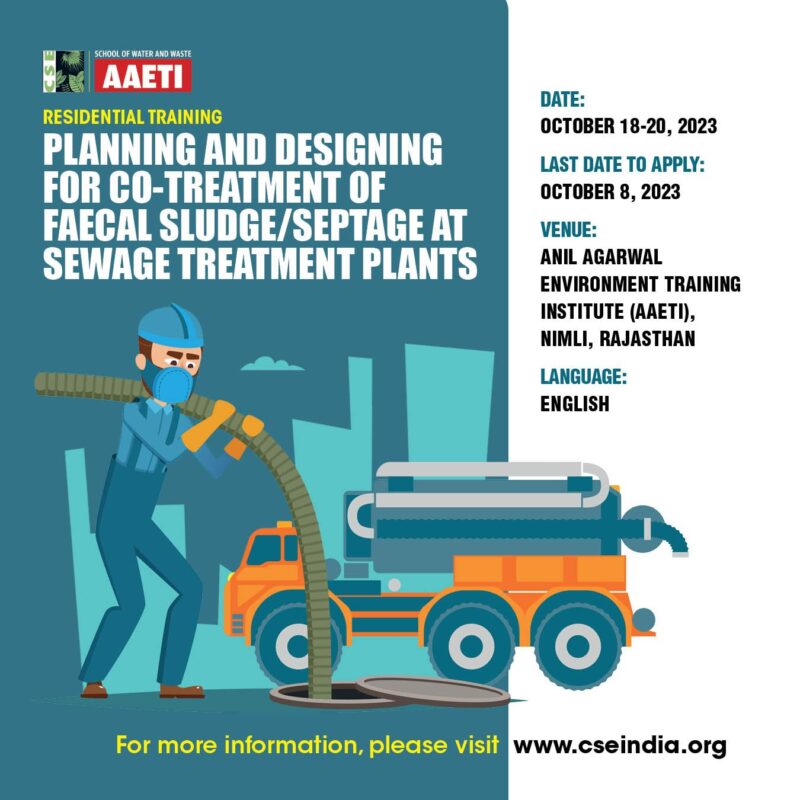Residential Training on Planning and Designing for Co-treatment of Faecal Sludge/Septage at Sewage Treatment Plants: CSE

![]()
Last date to apply 8th October 23 / Venue: Rajasthan / Date: 18th – 20th Oct 23
The Centre for Science and Environment (CSE) is a public interest research and advocacy organisation based in New Delhi. CSE researches into, lobbies for and communicates the urgency of development that is both sustainable and equitable. The scenario today demands using knowledge to bring about change. In other words, working India’s democracy. This is what we aim to do.The challenge, we see, is two-pronged. On the one hand, millions live within a biomass based subsistence economy, at the margins of survival. The environment is their only natural asset. But a degraded environment means stress on land, water and forest resources for survival. It means increasing destitution and poverty. Here, opportunity to bring about change is enormous.But it will need a commitment to reform – structural reform- in the way we do business with local communities. On the other hand, rapid industrialization is throwing up new problems: growing toxification and a costly disease burden. The answers will be in reinventing the growth model of the Western world for ourselves, so that we can leapfrog technology choices and find new ways of building wealth that will not cost us the earth. Our aim is to raise these concerns, participate in seeking answers and in pushing for answers, transforming these into policy and so practice. We do this through our research and by communicating our understanding through our publications. We call this knowledge-based activism. We hope we will make a difference.
Course fees
Government officials: Registration fee is waived for Central and state government officials*
Indian participants: Rs 23,000 (for double occupancy accommodation); Rs 30,000 (for single occupancy accommodation)
Special offers
- 20% off for group participation (two or more) from the same organization
- 15% off for full-time working representatives from registered NGOs
*Cost of travel to Delhi and back for nominated officials to be borne by the nominating authority.
Who can apply?
- Municipal engineers and engineers working in government implementation agencies
- Consultants and advisors working with government
- PSU/TSU officials supporting states/cities implementing FSSM
Indian cities face a serious problem of inadequate collection and treatment of sewage and faecal sludge — only about a third of urban India is served by networked services. Many large citieseither have a sewerage system with a sewage treatment plant(STP), or plan to build one in the near future. But connecting every part of a city with a sewer network is a resource-intensive and impossible process – cities, therefore, will continue to have pockets that will dependon on-site sanitation systems. The septage/faecal sludge collected from these onsite systems requires treatment either at a stand-alone faecal sludge treatment plant (FSTP) or at an STP.
In India, sewage treatment plants are grossly underutilised. As per the Central Pollution Control Board’s 2021 inventory of STPs in India, 1,469 STPs are operational in the country, with a treatment capacity of 31,841 million litre per day (MLD): these plants are treating only 20,235 MLD. In such a scenario, co-treatment of faecal sludge and septage in STPs is a feasible and promising solution to the problem of urban sewage/septage management.
Centre for Science and Environment (CSE) is offering a tailor-made three-day residential training programme on ‘Planning and Designing for Co-treatment of Faecal Sludge at Sewage Treatment Plants’. The training would aim to help the participants:
- understand the quantitativeand qualitative data/information required for assessing the technical viability of co-treating faecal sludge at STPs
- understand the technological challenges for co-treatment of faecal sludge/septage at different types of sewage treatment technologies
- understand the operation and maintenance requirements along with financial implications for co-treatment
Training methodology
The training methodology will follow a mixed approach involving lectures, group exercises, interactive discussions, video documentaries, exposure visits etc.
Click here to know more and Apply
Course Coordinator
Ravi Kumar
Deputy Programme Manager
Water Programme, CSE
Mobile: +91-9738287101
Email: ravi.kumar@cseindia.org

